- Home
- Muriel Spark
The Complete Short Stories Page 11
The Complete Short Stories Read online
Page 11
She looked round, but in the same second it was over. A deafening crack from the pistol and Désirée crumpled up. A movement by the inner door and David held the gun to his head. Sybil screamed, and was aware of running footsteps upstairs. The gun exploded again and David’s body dropped sideways.
With Barry and the natives she went round to the dining-room. Désirée was dead. David lingered a moment enough to roll his eyes in Sybil’s direction as she rose from Désirée’s body. He knows, thought Sybil quite lucidly, that he got the wrong woman.
‘What I can’t understand,’ said Barry when he called on Sybil a few weeks later, ‘is why he did it.’
‘He was mad,’ said Sybil.
‘Not all that mad,’ said Barry. ‘And everyone thinks, of course, that there was an affair between them. That’s what I can’t bear.’
‘Quite,’ said Sybil. ‘But of course he was keen on Désirée. You always said so. Those rows you used to have … You always made out you were jealous of David.’
‘Do you know,’ he said, ‘I wasn’t, really. It was a sort of… a sort of…’
‘Play-act,’ said Sybil.
‘Sort of. You see, there was nothing between them,’ he said. ‘And honestly, Carter wasn’t a bit interested in Désirée. And the question is why he did it. I can’t bear people to think …’
The damage to his pride, Sybil saw, outweighed his grief The sun was setting and she rose to put on the stoep light.
‘Stop!’ he said. ‘Turn round. My God, you did look like Désirée for a moment.
‘You’re nervy,’ she said, and switched on the light.
‘In some ways you do look a little like Désirée,’ he said. ‘In some lights,’ he said reflectively.
I must say something, thought Sybil, to blot this notion from his mind. I must make this occasion unmemorable, distasteful to him.
‘At all events,’ she said, ‘you’ve still got your poetry.
‘That’s the great thing,’ he said, ‘I’ve still got that. It means everything to me, a great consolation. I’m selling up the estate and joining up. The kids are going into a convent and I’m going up north. What we need is some good war poetry. There hasn’t been any war poetry.
‘You’ll make a better soldier,’ she said, ‘than a poet.’
‘What do you say?’
She repeated her words fairly slowly, and with a sense of relief, almost of absolution. The season of falsity had formed a scab, soon to fall away altogether. There is no health, she thought, for me, outside of honesty.
‘You’ve always,’ he said, ‘thought my poetry was wonderful.’
‘I have said so,’ she said, ‘but it was a sort of play-act. Of course, it’s only my opinion, but I think you’re a third-rater poet.’
‘You’re upset, my dear,’ he said.
He sent her the four reels of film from Cairo a month before he was killed in action. ‘It will be nice in later years,’ he wrote, ‘for you to recall those good times we used to have.’
‘It has been delightful,’ said her hostess. ‘You haven’t changed a bit. Do you feel any different?’
‘Well yes, I feel rather differently about everything, of course.’ One learns to accept oneself.
‘A hundred feet of one’s past life!’ said the young man. ‘If they were mine, I’m sure I should be shattered. I should be calling “Lights! Lights!” like Hamlet’s uncle.’
Sybil smiled at him. He looked back, suddenly solemn and shrewd. ‘How tragic, those people being killed in shooting affairs,’ said the elderly woman.
‘The last reel was the best,’ said her hostess. ‘The garden was entrancing. I should like to see that one again; what about you, Ted?’
‘Yes, I liked those nature-study shots. I feel I missed a lot of it,’ said her husband.
‘Hark at him — nature-study shots!’
‘Well, those close-ups of tropical plants.
Everyone wanted the last one again.
‘How about you, Sybil?’
Am I a woman, she thought calmly, or an intellectual monster? She was so accustomed to this question within herself that it needed no answer. She said, ‘Yes, I should like to see it again. It’s an interesting experience.’
The Seraph and the Zambezi
You may have heard of Samuel Cramer, half poet, half journalist, who had to do with a dancer called the Fanfarlo. But, as you will see, it doesn’t matter if you have not. He was said to be going strong in Paris early in the nineteenth century, and when I met him in 1946 he was still going strong, but this time in a different way. He was the same man, but modified. For instance, in those days, more than a hundred years ago, Cramer had persisted for several decades, and without affectation, in being about twenty-five years old. But when I knew him he was clearly undergoing his forty-two-year-old phase.
At this time he was keeping a petrol pump some four miles south of the Zambezi River where it crashes over a precipice at the Victoria Falls. Cramer had some spare rooms where he put up visitors to the Falls when the hotel was full. I was sent to him because it was Christmas week and there was no room in the hotel.
I found him trying the starter of a large, lumpy Mercedes outside his corrugated-iron garage, and at first sight I judged him to be a Belgian from the Congo. He had the look of north and south, light hair with canvas-coloured skin. Later, however, he told me that his father was German and his mother Chilean. It was this information rather than the ‘S. Cramer’ above the garage door which made me think I had heard of him.
The rains had been very poor and that December was fiercely hot. On the third night before Christmas I sat on the stoep outside my room, looking through the broken mosquito-wire network at the lightning in the distance. When an atmosphere maintains an excessive temperature for a long spell something seems to happen to the natural noises of life. Sound fails to carry in its usual quantity, but comes as if bound and gagged. That night the Christmas beetles, which fall on their backs on every stoep with a high tic-tac, seemed to be shock-absorbed. I saw one fall and the little bump reached my ears a fraction behind time. The noises of minor wild beasts from the bush were all hushed-up, too. In fact it wasn’t until the bush noises all stopped simultaneously, as they frequently do when a leopard is about, that I knew there had been any sound at all.
Overlying this general muted hum, Cramer’s sundowner party progressed farther up the stoep. The heat distorted every word. The glasses made a tinkle that was not of the substance of glass, but of bottles wrapped in tissue paper. Sometimes, for a moment, a shriek or a cackle would hang torpidly in space, but these were unreal sounds, as if projected from a distant country, as if they were pocket-torches seen through a London fog.
Cramer came over to my end of the stoep and asked me to join his party. I said I would be glad to, and meant it, even though I had been glad to sit alone. Heat so persistent and so intense sucks up the will.
Five people sat in wicker armchairs drinking highballs and chewing salted peanuts. I recognized a red-haired trooper from Livingstone, just out from England, and two of Cramer’s lodgers, a tobacco planter and his wife from Bulawayo. In the custom of those parts, the other two were introduced by their first names. Mannie, a short dark man of square face and build, I thought might be a Portuguese from the east coast. The woman, Fanny, was picking bits out of the frayed wicker chair and as she lifted her glass her hand shook a little, making her bracelets chime. She would be about fifty, a well-tended woman, very neat. Her grey hair, tinted with blue, was done in a fringe above a face puckered with malaria.
In the general way of passing the time with strangers in that countryside, I exchanged with the tobacco people the names of acquaintances who lived within a six-hundred-mile radius of where we sat, reducing this list to names mutually known to us. The trooper contributed his news from the region between Lusaka and Livingstone. Meanwhile an argument was in process between Cramer, Fanny and Mannie, of which Fanny seemed to be getting the better. It appeared there w
as to be a play or concert on Christmas Eve in which the three were taking part. I several times heard the words ‘troupe of angels’, ‘shepherds’, ‘ridiculous price’ and ‘my girls’ which seemed to be key words in the argument. Suddenly, on hearing the trooper mention a name, Fanny broke off her talk and turned to us.
‘She was one of my girls,’ she said, ‘I gave her lessons for three years.’
Mannie rose to leave, and before Fanny followed him she picked a card from her handbag and held it out to me between her fingernails.
‘If any of your friends are interested …’ said Fanny hazily.
I looked at this as she drove off with the man, and above an address about four miles up the river I read:
Mme La Fanfarlo (Paris, London)
Dancing Instructress. Ballet. Ballroom.
Transport provided By Arrangement
Next day I came across Cramer still trying to locate the trouble with the Mercedes.
‘Are you the man Baudelaire wrote about?’ I asked him.
He stared past me at the open waste veldt with a look of tried patience.
‘Yes,’ he replied. ‘What made you think of it?’
‘The name Fanfarlo on Fanny’s card,’ I said. ‘Didn’t you know her in Paris?’
‘Oh, yes,’ said Cramer, ‘but those days are finished. She married Manuela de Monteverde — that’s Mannie. They settled here about twenty years ago. He keeps a Kaffir store.’
I remembered then that in the Romantic age it had pleased Cramer to fluctuate between the practice of verse and that of belles-lettres, together with the living up to such practices.
I asked him, ‘Have you given up your literary career?’
‘As a career, yes,’ he answered. ‘It was an obsession I was glad to get rid of’
He stroked the blunt bonnet of the Mercedes and added, ‘The greatest literature is the occasional kind, a mere afterthought.’
Again he looked across the veldt where, unseen, a grey-crested lourie was piping ‘go’way, go’way’.
‘Life,’ Cramer continued, ‘is the important thing.’
‘And do you write occasional verses?’ I inquired.
‘When occasion demands it,’ he said. ‘In fact I’ve just written a Nativity Masque. We’re giving a performance on Christmas Eve in there.’ He pointed to his garage, where a few natives were already beginning to shift petrol cans and tyres. Being members neither of the cast nor the audience, they were taking their time. A pile of folded seats had been dumped alongside.
Late on the morning of Christmas Eve I returned from the Falls to find a crowd of natives quarrelling outside the garage, with Cramer swearing loud and heavy in the middle. He held a sulky man by the shirt-sleeve, while with the other hand he described his vituperation on the hot air. Some mission natives had been sent over to give a hand with laying the stage, and these, with their standard-three school English, washed faces and white drill shorts, had innocently provoked Cramer’s raw rag-dressed boys. Cramer’s method, which ended with the word ‘police’, succeeded in sending them back to work, still uttering drum-like gutturals at each other.
The stage, made of packing-cases with planks nailed across, was being put at the back of the building, where a door led to the yard, the privy and the native huts. The space between this door and the stage was dosed off by a row of black Government blankets hung on a line; this was to be the dressing-room. I agreed to come round there that evening to help with the lighting, the make-up, and the pinning on of angels’ wings. The Fanfarlo’s dancing pupils were to make an angel chorus with carols and dancing, while she herself, as the Virgin, was to give a representative ballet performance. Owing to her husband’s very broken English, he had been given a silent role as a shepherd, supported by three other shepherds chosen for like reasons. Cramer’s part was the most prominent, for he had the longest speeches, being the First Seraph. It had been agreed that, since he had written the masque, he could best deliver most of it; but I gathered there had been some trouble at rehearsals over the cost of the production, with Fanny wanting elaborate scenery as being due to her girls.
The performance was set to begin at eight. I arrived behind the stage at seven-fifteen to find the angels assembled in ballet dresses with wings of crinkled paper in various shades. The Fanfarlo wore a long white transparent skirt with a sequin top. I was helping to fix on the Wise Men’s beards when I saw Cramer. He had on a toga-like garment made up of several thicknesses of mosquito-net, but not thick enough to hide his white shorts underneath. He had put on his make-up early, and this was melting on his face in the rising heat.
‘I always get nerves at this point,’ he said. ‘I’m going to practise my opening speech.’
I heard him mount the stage and begin reciting. Above the voices of excited children I could only hear the rhythm of his voice; and I was intent on helping the Fanfarlo to paint her girls’ faces. It seemed impossible. As fast as we lifted the sticks of paint they turned liquid. It was really getting abnormally hot.
‘Open that door,’ yelled the Fanfarlo. The back door was opened and a crowd of curious natives pressed round the entrance. I left the Fanfarlo ordering them off, for I was determined to get to the front of the building for some air. I mounted the stage and began to cross it when I was aware of a powerful radiation of heat coming from my right. Looking round, I saw Cramer apparently shouting at someone, in the attitude of his dealings with the natives that morning. But he could not advance because of this current of heat. And because of the heat I could not at first make out who Cramer was rowing with; this was the sort of heat that goes for the eyes. But as I got farther towards the front of the stage I saw what was standing there.
This was a living body. The most noticeable thing was its constancy; it seemed not to conform to the law of perspective, but remained the same size when I approached as when I withdrew. And altogether unlike other forms of life, it had a completed look. No part was undergoing a process; the outline lacked the signs of confusion and ferment which commonly indicate living things, and this was also the principle of its beauty. The eyes took up nearly the whole of the head, extending far over the cheekbones. From the back of the head came two muscular wings which from time to time folded themselves over the eyes, making a draught of scorching air. There was hardly any neck. Another pair of wings, tough and supple, spread from below the shoulders, and a third pair extended from the calves of the legs, appearing to sustain the body. The feet looked too fragile to bear up such a concentrated degree of being.
European residents of Africa are often irresistibly prompted to speak kitchen kaffir to anything strange.
‘Hamba!’ shouted Cramer, meaning ‘Go away’.
‘Now get off the stage and stop your noise,’ said the living body peaceably.
‘Who in hell are you?’ said Cramer, gasping through the heat.
‘The same as in Heaven,’ came the reply, ‘a Seraph, that’s to say.’
‘Tell that to someone else,’ Cramer panted. ‘Do I look like a fool?’
‘I will. No, nor a Seraph either,’ said the Seraph.
The place was filling with heat from the Seraph. Cramer’s paint was running into his eyes and he wiped them on his net robe. Walking backward to a less hot place he cried, ‘Once and for all —’
‘That’s correct,’ said the Seraph.
‘— this is my show,’ continued Cramer.
‘Since when?’ the Seraph said.
‘Right from the start,’ Cramer breathed at him.
‘Well, it’s been mine from the Beginning,’ said the Seraph, ‘and the Beginning began first.’
Climbing down from the hot stage, Cramer caught his seraphic robe on a nail and tore it. ‘Listen here,’ he said, ‘I can’t conceive of an abnormality like you being a true Seraph.’
‘True,’ said the Seraph.
By this time I had been driven by the heat to the front entrance. Cramer joined me there. A number of natives had assembled. The audience ha
d begun to arrive in cars and the rest of the cast had come round the building from the back. It was impossible to see far inside the building owing to the Seraph’s heat, and impossible to re-enter.
Cramer was still haranguing the Seraph from the door, and there was much speculation among the new arrivals as to which of the three familiar categories the present trouble came under, namely, the natives, Whitehall, or leopards.
‘This is my property,’ cried Cramer, ‘and these people have paid for their seats. They’ve come to see a masque.
‘In that case,’ said the Seraph, ‘I’ll cool down and they can come and see a masque.
‘My masque, said Cramer.
‘Ah, no, mine,’ said the Seraph. ‘Yours won’t do.’
‘Will you go, or shall I call the police?’ said Cramer with finality.
‘I have no alternative,’ said the Seraph more finally still.
Word had gone round that a mad leopard was in the garage. People got back into their cars and parked at a safe distance; the tobacco planter went to fetch a gun. A number of young troopers had the idea of blinding the mad leopard with petrol and ganged up some natives to fill petrol cans from the pump and pass them chainwise to the garage.
‘This’ll fix him,’ said a trooper.
‘That’s right, let him have it,’ said Cramer from his place by the door.
‘I shouldn’t do that,’ said the Seraph. ‘You’ll cause a fire.’
The first lot of petrol to be flung into the heat flared up. The seats caught alight first, then the air itself began to burn within the metal walls till the whole interior was flame feeding on flame. Another car-load of troopers arrived just then and promptly got a gang of natives to fill petrol cans with water. Slowly they drenched the fire. The Fanfarlo mustered her angels a little way up the road. She was trying to reassure their parents and see what was happening at the same time, furious at losing her opportunity to dance. She aimed a hard poke at the back of one of the angels whose parents were in England.

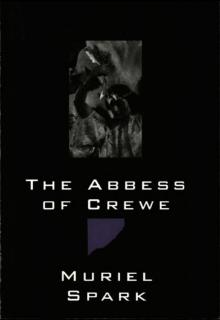 The Abbess of Crewe: A Modern Morality Tale
The Abbess of Crewe: A Modern Morality Tale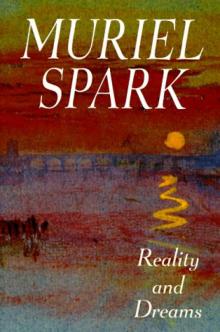 Reality and Dreams
Reality and Dreams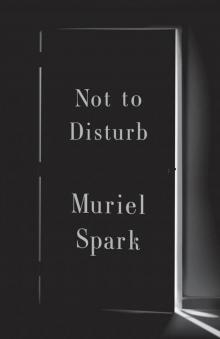 Not to Disturb
Not to Disturb The Prime of Miss Jean Brodie
The Prime of Miss Jean Brodie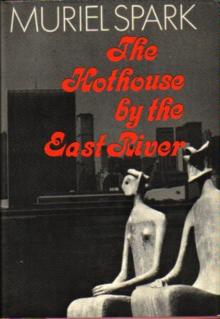 The Hothouse by the East River
The Hothouse by the East River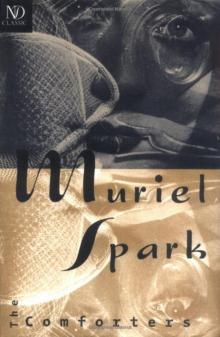 The Comforters
The Comforters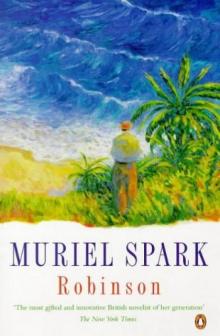 (1958) Robinson
(1958) Robinson Unknown
Unknown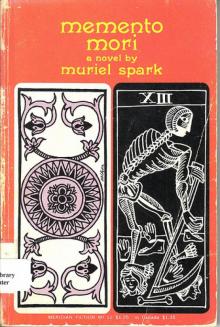 Memento Mori
Memento Mori The Finishing School
The Finishing School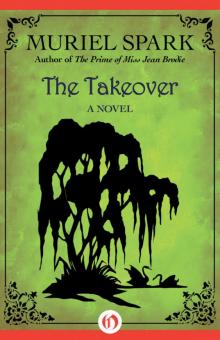 The Takeover
The Takeover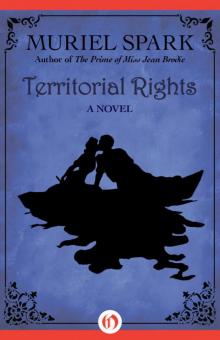 Territorial Rights
Territorial Rights The Complete Short Stories
The Complete Short Stories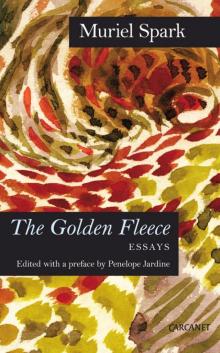 The Golden Fleece: Essays
The Golden Fleece: Essays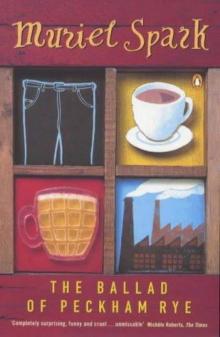 The Ballad of Peckham Rye
The Ballad of Peckham Rye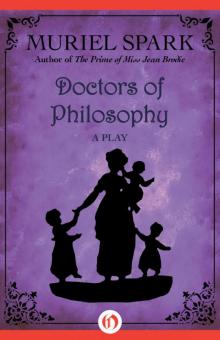 Doctors of Philosophy: A Play
Doctors of Philosophy: A Play The Mandelbaum Gate
The Mandelbaum Gate Loitering With Intent
Loitering With Intent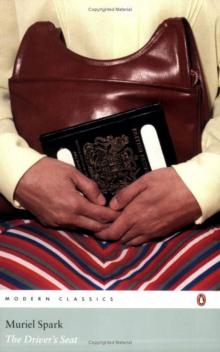 The Driver's Seat
The Driver's Seat Complete Poems: Muriel Spark
Complete Poems: Muriel Spark Symposium
Symposium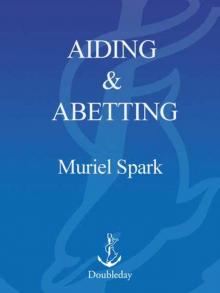 Aiding and Abetting
Aiding and Abetting The Golden Fleece
The Golden Fleece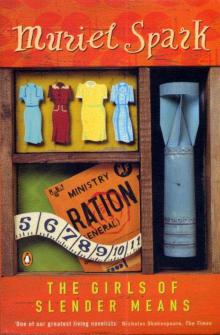 The Girls of Slender Means
The Girls of Slender Means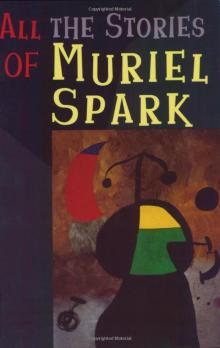 Alice Long’s Dachshunds
Alice Long’s Dachshunds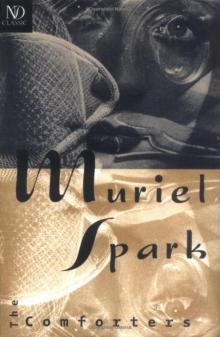 (1954) The Comforters
(1954) The Comforters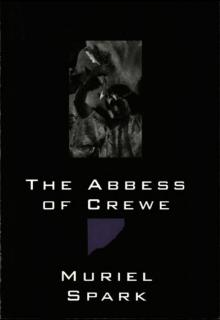 The Abbess of Crewe
The Abbess of Crewe Curriculum Vitae
Curriculum Vitae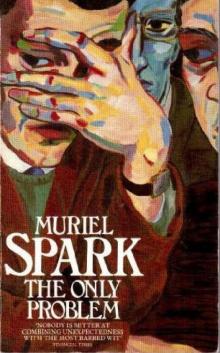 The Only Problem
The Only Problem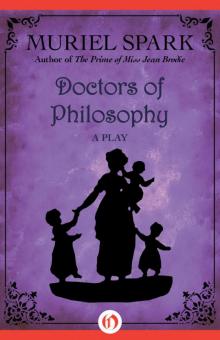 Doctors of Philosophy
Doctors of Philosophy